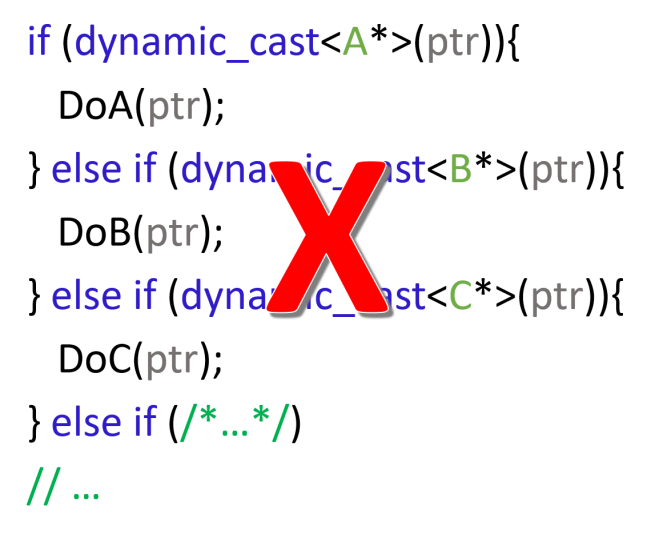wiki.c2 External Polymorphism
Any mechanism for implementing polymorphism that is external to the definition of the object displaying polymorphic behavior. Switch statements based on a type code are probably the simplest of such mechanisms.
NOTE:
1、关于 "Switch statements based on a type code are probably the simplest of such mechanisms" 的最最典型的案例就是在 gieseanw Stop reimplementing the virtual table and start using double dispatch 中给出的如下示例:
There are other, more ingenious mechanisms, available as well:
1、The paper "External Polymorphism -- An object structural pattern for transparently extending C++ concrete data types" by Cleeland, Schmidt, and Harrison cleverly combines dynamic binding and the template mechanism. http://www.cs.wustl.edu/~schmidt/PDF/External-Polymorphism.pdf
NOTE: 这篇paper收录在了
C++\Pattern\Adapter-pattern\External-polymorphism-pattern\TODO-paper-vanderbilt.edu-External-Polymorphism章节
2、The GenericFunction (which is used by the TranslatorPattern) uses a hash table with class names as keys and corresponding functions (see FunctionObjectPattern) as values.
NOTE:
1、这种方式是最常使用的一种方式,我们将它称为generic function pattern
2、上述 TranslatorPattern ,我看了一下,和interpreter pattern是类似的,因此,将它归入到了interpreter pattern章节中
3、MultiMethods -- methods that are polymorphic on all of their arguments rather than one. Implemented in languages such as CommonLispObjectSystem, DylanLanguage, CecilLanguage, and NiceLanguage. These are useful for ExternalPolymorphism even if having a single (polymorphic) argument, as they can be implemented without changing the underyling class.
NOTE:
1、很多programming language是不支持multi method的,C++也是如此
